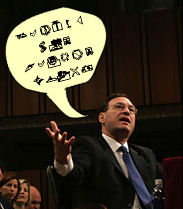Stop It, You’re Killing Me
 Friday, January 13, 2006 at 11:38AM
Friday, January 13, 2006 at 11:38AM  Quote: "We believe our program prevents hardening of the attitudes." Retired Lt. Col. James Scott, the Pentagon's certified laughter training specialist, in USA Today.
Quote: "We believe our program prevents hardening of the attitudes." Retired Lt. Col. James Scott, the Pentagon's certified laughter training specialist, in USA Today.
Figure of Speech: paronomasia (pa ra no MAY sia), the near-pun.
The National Guard desperately needs armor, so the Pentagon leaped into action, sending a guy to laughter school.
While it won't stop bullets, forced laughter does seem to have some medical benefits, and God knows, these guys need medical benefits. We’re talking forced laughter, though. Scott's paronomasia (Greek for "play on like-sounding words")--"arteries" and "attitudes"--isn't exactly a laugh riot.
It's more like a laugh invasion.
Snappy Answer: "And fighting insurgents stimulates the guns!"






